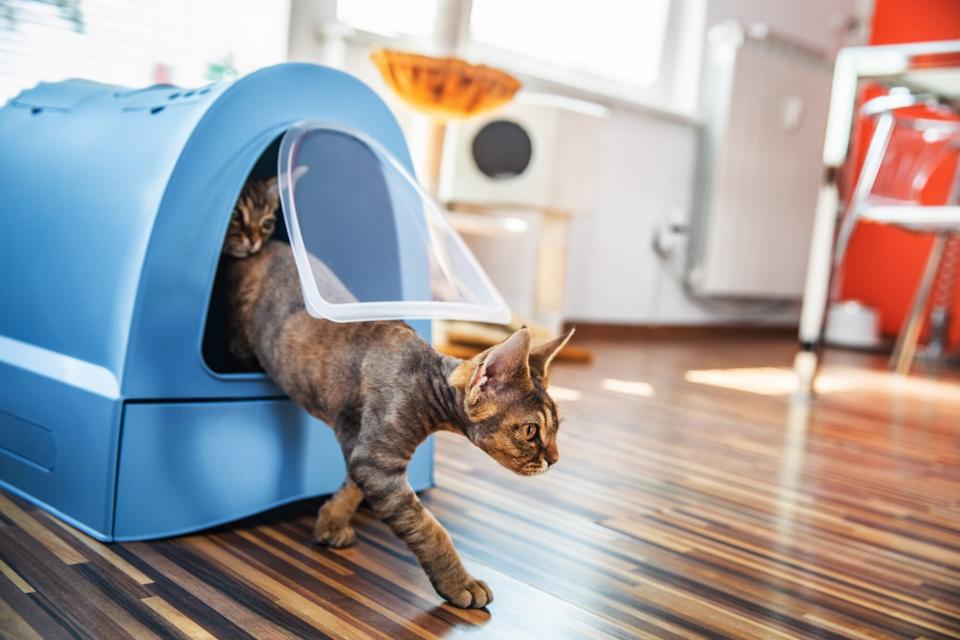How to Choose the Right Cat Litter for Your Household
Today's cat litters are made from several types of materials. The first litter for indoor use was invented by Edward Lowe in the late 1940s, according to NPR, when he realized that the clay he sold to construction companies was absorbent enough to soak up waste and would be much better than the sand that people currently used. Clay eventually became the dominant choice for cat litter and, since then, new materials have been developed for the use in our cats' litter boxes over the past century.

CasarsaGuru / Getty Images
We can now choose from at least six different types of litter and hundreds of brands, so how do we select the right one for our feline friends? Ahead, we asked a veterinary expert for his recommendations.
Related: 10 Modern Cat Litter Boxes That Hide in Plain Sight
Types of Litter
The six main types of litter available today include clay litter, recycled newspaper, walnut, silica gel crystals, pine, and wheat and grass litters. "One of the first and most common types of litters, the main ingredient of clumping clay litter is sodium bentonite," explains Dr. Jesus Aramendi, senior veterinarian at Chewy. "Sodium bentonite is a type of clay that reacts by swelling and binding the urine-soaked litter together. Clay litter will cover the cat feces very similarly like it happens in nature with dirt, making it easier to scoop out and clean." People may choose newspaper or pine litter because they are free of dust and environmentally friendly, and wheat and grass litters also have the benefit of being biodegradable. Natural litters also tend to have a pleasant smell that many people like.
Silica gel crystals are a new type of litter. "Silica gel crystals may look very similar to the small humidity absorbing bags that come in shoes and purses but these silica gel crystals for cat litter boxes are specially made for cats and are very safe to use," Dr. Aramendi says. "These porous crystals are made of sodium silicate that has been processed with oxygen and water and has the potential of absorbing 40 times its weight in liquid. They are also effective in covering feces and can be scooped easily."
Choosing the Right Litter
So, when there are so many different types to choose from, how do we make the right choice? "Every cat and cat owner will have a preference towards a particular type of litter. I recommend to always think of your cats first and foremost when selecting a litter for them," says Dr. Aramendi. "Some cats will be very particular with the type of soiling they use to eliminate (urinate and defecate). Cats with urinary and behavioral conditions tend to be very particular with their litter and tend to dislike scented litters or any litter that has a strong odor."
Clay litters may aggravate cats that have respiratory issues because of the dust, and cats that have urinary tract issues may benefit from silica gel litters because owners can, "if there is anything abnormal in their cat's urine," explains Dr. Aramendi. "For instance, cats with urinary tract infections sometimes may urinate with specks of bloods, and this is easier to identify on silica pellets than on a dark colored litter, clay or recycled paper."
In addition to your cat's opinion on the type of litter, pet caretakers should consider how much absorbency they want in a litter, how often they want to scoop or change the litter box, and whether the type of litter is safe for their cat. "Clumping unscented clay litters are a great option if cats are young and don't have any respiratory or allergy issues. A few top-rated options that are lightweight, unscented clay litters include Tidy Cats ($12.49, target.com), Arm & Hammer ($14.99, chewy.com) and Frisco (from $8, chewy.com), which has over 5,000 reviews," says Dr. Aramendi. " Yesterday's News (from $7, chewy.com) has almost no dust and is lighter than clay. Tidy Cats' Breeze System ($57.99, chewy.com) is also a popular product, however keep in mind it requires a special type of litter box and disposable pads."

